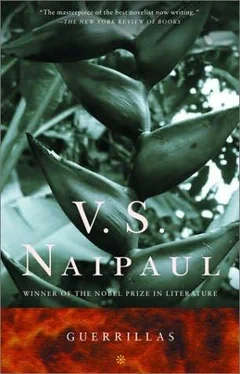V. Naipaul - Guerrillas
Здесь есть возможность читать онлайн «V. Naipaul - Guerrillas» весь текст электронной книги совершенно бесплатно (целиком полную версию без сокращений). В некоторых случаях можно слушать аудио, скачать через торрент в формате fb2 и присутствует краткое содержание. Год выпуска: 1990, ISBN: 1990, Издательство: Vintage, Жанр: Современная проза, на английском языке. Описание произведения, (предисловие) а так же отзывы посетителей доступны на портале библиотеки ЛибКат.
- Название:Guerrillas
- Автор:
- Издательство:Vintage
- Жанр:
- Год:1990
- ISBN:978-0679731740
- Рейтинг книги:5 / 5. Голосов: 1
-
Избранное:Добавить в избранное
- Отзывы:
-
Ваша оценка:
- 100
- 1
- 2
- 3
- 4
- 5
Guerrillas: краткое содержание, описание и аннотация
Предлагаем к чтению аннотацию, описание, краткое содержание или предисловие (зависит от того, что написал сам автор книги «Guerrillas»). Если вы не нашли необходимую информацию о книге — напишите в комментариях, мы постараемся отыскать её.
Guerrillas — читать онлайн бесплатно полную книгу (весь текст) целиком
Ниже представлен текст книги, разбитый по страницам. Система сохранения места последней прочитанной страницы, позволяет с удобством читать онлайн бесплатно книгу «Guerrillas», без необходимости каждый раз заново искать на чём Вы остановились. Поставьте закладку, и сможете в любой момент перейти на страницу, на которой закончили чтение.
Интервал:
Закладка:
She walked out to the front gate in her striped sacking dress, the one she had worn to some dinner parties and now used as a dressing gown. The newspaper was in the newspaper box on the gate: it was a second or so before she thought it was strange that life should continue, that newspapers should be printed during the night and delivered in the morning.
The front page showed no hysteria. It preserved its regular format, and the events of the previous day had been reduced to a number of separate and apparently unrelated stories. The main headline announced the state of emergency; the text, in heavy type, was the official proclamation. A single column on the left, with a grotesque old photograph, told of Meredith Herbert’s recall to the government as minister without portfolio. A double-column story at the foot of the page, Guerrilla Shin in Dawn Shoot-out , was about the shooting of Stephens and the recovery of banknotes from his mother’s house. Another item reported, more or less in the words of an official communiqué, a “police operation” in the center of the city.
Standard news, a normal day: the items were like items Jane seemed to have been reading in the newspaper ever since she had arrived.
Adela was up. From her room came a tremendous throat-clearing which was probably intended to conceal other noises. And after this there was her morning radio program, I Hear the South Land Singing . Half-past six.
So life was continuing. And when, in her white uniform, Adela started striding through the large rooms, thump, thump, on parquet and terrazzo, the house was like itself again. Clearing away the things from last night’s supper, Adela thrust her fingers down the sides of the beer glasses. She went still for a second, and then had a little frenzy. A tremor ran through her body, she knitted her brow, bunched her lips together and made an angry noise which sounded like stewps. Then, the frenzy over, her protest made, she lifted the glasses and became active again.
At seven o’clock, as always on a weekday, they listened to the BBC news, which was relayed by the local radio station. There was no mention of their own crisis.
After breakfast and the newspaper, Roche said, “So Meredith was a minister when he came among us yesterday. I suppose he liked the idea of keeping it secret. I must say I feel more and more at sea here. I can’t read these people. All these little secrets. I suppose I’m an easy man to fool. Mrs. Stephens certainly fooled me. I never guessed — the idea didn’t even occur to me — that she was hiding all that money for her son.”
Though Jane was listening to what he was saying, and though she was letting her mind play with his words, she was without the energy or will to acknowledge his words. And then it was too late. Her silence became pointed, and his face hardened as it had hardened the previous evening.
He left the kitchen and went to the back door and looked down the hills to the city.
He said, “Jimmy’s big moment. It just goes to show. I never thought that anything like that was possible. The one gesture. Meredith knew what he was talking about.” He paused and then said, as if speaking to himself, “I should have gone to the house. They’ll believe I knew and didn’t go.”
Abruptly he turned and walked with determination back to the kitchen, to the dining area behind the cupboard divider. Jane was drinking coffee out of a heavy earthenware cup, company issue. She was aware of him walking toward her; she was aware of his sudden rage. She steadied the cup with her left hand and held it against her lips, her elbows on the white formica table. Her eyes were large and moist. He was infuriated by her air of expectation, her posture, her lips on the coffee cup.
He said, “I’ve been thinking about it. I’ve been thinking about it all night. I’ve heard you talk about your friends. Who are your friends? What do you talk about? What do you offer them? What do you have to offer them?”
He had never spoken to her like that before. And she was not at all dismayed by his anger. She put the cup down. More decisively, then, she took the newspaper, stood up and, lifting the long sacking dress above her ankles, walked out to the porch and sat down in the sun in one of the metal chairs Adela had wiped dry.
She sat there and was confirmed in the feeling of solitude that had come to her the evening before. And, unexpectedly, from this feeling of solitariness she found that she had begun to draw strength.
She sat out in the sun, steadily less pleasant, until she was dazed. This she did on most mornings, until the heat, increasing together with the noise of the working city, drove her inside: the individual noises of horns and motorcycles, children’s cries, bicycle bells, trucks and buses in low gear, gradually multiplying and becoming a steady rhythmic throb which, mingled with the noise of a thousand radios tuned to the same station, turned into what the ear could take for a reggae beat, a creation of sun and heat. But the city remained silent this morning. Sun and heat awakened no life and seemed instead to deaden the city. The sun dried out the wet clumps of long Bermuda grass that grew against the retaining wall of the back garden; obliterated the beads of dew on hibiscus leaves and flowers; dried out the lawn around the porch. Threads of smoke began to rise here and there from the hills and, far away, from the great plain. Mangrove and sea blurred together in the heat haze.
Just after noon she saw the first fire in the city below. Not the thin white smoke of bush fires, or the brown-gray spread of the burning rubbish dump; but a small inky eruption of the densest black, erupting and erupting and not becoming less dense or less black, with little spurts and streaks of red that then fell back into the blackness. Explosions, but the sound didn’t carry up to the Ridge. From the Ridge the sunlit city continued to be silent. Then two other fires could be seen: two little leaks of dense black smoke.
Harry telephoned. Jane answered.
Harry said, “They’re burning a few liquor shops. They take out another procession this morning. That man Jimmy Ahmed, nuh. You know, I hear they chase Meredith. The police too damn frighten now to shoot. Look, Jane, I think we should telephone at regular intervals. Just in case, nuh. I hear the government about to resign. One or two of the guys fly out already.”
Jane said, “But I haven’t seen any planes leave.”
“Me neither. But that’s what they say. Truck after truck just taking furniture and china and things like that to the airport. China! You see those people! Anybody would think that Wedgwood and Spode close down. It would be pathetic if it wasn’t so damn frightening. But, look, we must telephone, eh. Just to keep in touch, nuh. While the telephone still going. What is the food situation like by you? You have enough?”
“I don’t know. But I think so.”
The fires continued to burn in the silent city. Adela came out and stood on the porch and looked down at the city. But she never mentioned the fires to Jane or Roche; and neither of them spoke of the fires.
Between one and five Adela was free. But when Jane went to the kitchen in the middle of the afternoon to get a glass of water she saw Adela there, in her uniform, buttering sliced bread: two or three stacks of buttered slices on one side, unbuttered slices on the other. Around the bread stacks were dishes of mashed tuna and salmon, bowls of chopped chicken, sliced cucumber, and sliced eggs. Adela didn’t acknowledge Jane’s presence; she went on buttering bread.
Jane said, “Sandwiches?”
Adela bunched her lips and knitted her brow, buttering now with the air of someone too busy to waste time on idle talk.
Jane recognized Adela’s explosive mood and said no more. She drank a tumbler of cold water — there were four bottles in the refrigerator to see them through the waterless afternoon — and went back to her shuttered room. There she began to think. The electricity might fail. No electricity, no water, no refrigerator, no lights, no cooking: sandwiches for the long siege. Would they eat all those sandwiches? Would the sandwiches keep? She remembered what Harry had said about food, and she became dismayed. She went out into the passage and saw Roche. He had been to the kitchen and had seen what Jane had seen; he too was dismayed.
Читать дальшеИнтервал:
Закладка:
Похожие книги на «Guerrillas»
Представляем Вашему вниманию похожие книги на «Guerrillas» списком для выбора. Мы отобрали схожую по названию и смыслу литературу в надежде предоставить читателям больше вариантов отыскать новые, интересные, ещё непрочитанные произведения.
Обсуждение, отзывы о книге «Guerrillas» и просто собственные мнения читателей. Оставьте ваши комментарии, напишите, что Вы думаете о произведении, его смысле или главных героях. Укажите что конкретно понравилось, а что нет, и почему Вы так считаете.












